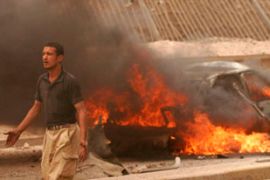Mass funerals held in Kirkuk
Funerals held after car bombs kill scores of people

The massive lorry bomb carved a huge crater ringed with smoking wreckage, while the streets of Kirkuk were deserted as pedestrians kept indoors, the AFP news agency reported.
Police vehicles patrolled the city in a bid to deter further attacks.
“The deployment of police will give us some comfort,” said Omar Abdullah, a baker and one of the few local shopkeepers to open after the blasts.
“However, the explosions have left no work for me,” he said.
Deadly aftermath
Kirkuk’s policemen were shocked by the blasts.
Aras Ghafour, a policeman, said: “Yesterday’s catastrophe was unprecedented. The charred and mutilated bodies stunned us. We are human beings, after all.”
“What should we do when a bomber wants to kill himself and innocent people?”
“The challenge is big and the situation is serious,” he said.
More than two dozen of the 185 wounded are in a serious condition and were transferred to the Kurdish city of Sulaimaniyah for treatment.
A joint statement by Ryan Crocker, US ambassador to Iraq and general David Petraeus, the head of US troops, said: “This attack is another sad example of the nature of the enemy and its use of indiscriminate violence to kill innocent citizens.”
Divided region
Since the 2003 US-led invasion of Iraq, Kirkuk’s political status has been contested by the city’s Arabs, Kurds and Turkmen.
Tensions have heightened in recent months ahead of a possible referendum by the end of the year to decide whether Kirkuk will join the Kurdish region.
The city’s Turkmen and Arab communities have demanded that it be postponed until land claims can be settled.
Thousands of Kurds were driven from their homes and Arabs from around Iraq moved into the region with land grants and cash payouts.
In 2003, Kurds streamed back into Kirkuk and now control the local government and much of the security forces.